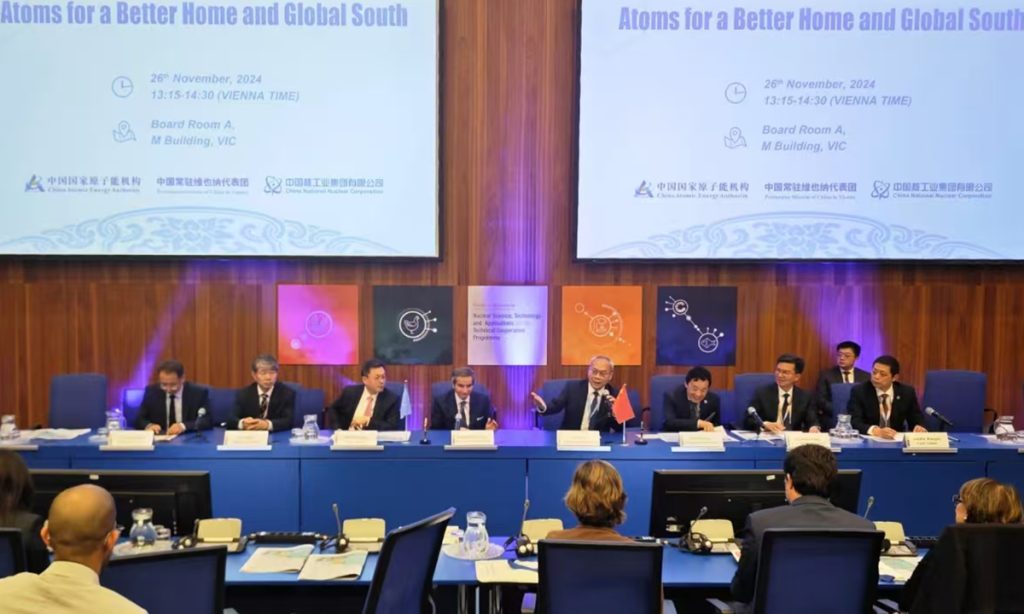Atoms for a better home: CNNC showcases 'Chinese solution' on nuclear technology application to the world

The 2024 International Atomic Energy Agency (IAEA) Ministerial Conference is taking place from November 26 to 28 in Vienna, Austria. On November 26, China held a side event themed "Atoms for a Better Home," focusing on integrated solutions for irradiation and nuclear medicine. At the event, China National Nuclear Corporation (CNNC) presented its solution for nuclear technology applications, highlighting China's achievements and expertise in nuclear medicine, irradiation, medical isotopes, and radioactive drug production.
IAEA Director General Rafael Mariano Grossi and Deputy Director General Liu Hua attended the event and visited the exhibition of China's nuclear technology application achievements. Also present were IAEA Deputy Director General Najat Mokhtar, Director-General of the Food and Agriculture Organization of the United Nations Qu Dongyu, Deputy Director General of United Nations Industrial Development Organization Zou Ciyong, China's Permanent Representative of China to the United Nations and other international organizations in Vienna Li Song, Secretary General of the China Atomic Energy Agency Huang Ping and CNNC Chief Accountant Wang Xuejun. More than 200 officials, experts, and media representatives from countries such as Russia, Cuba, Thailand, Syria, Sudan, and Pakistan and international organizations also attended the event.
At the event, Grossi said that the Global Development Initiative proposed by Chinese President Xi Jinping has a significant impact on guiding the international community to seek common development and enhance the well-being of people worldwide. Grossi expressed hope that China would continue its active participation in global development cooperation, making greater contributions to building a safer world and creating a better life.
Qu emphasized that food security is fundamental to human survival and development. He highlighted the need to further leverage nuclear technology in advancing food security efforts, to tackle global food challenges and benefit humanity.
Li noted that the applications of nuclear technology offer unique opportunities to the building of a community with a shared future for mankind through technological innovation. Nuclear technology should be utilized as a catalyst for exploring innovative applications across various fields.
Huang mentioned that 2024 marks the 40th anniversary of China's accession to the IAEA. China and the IAEA have engaged in extensive cooperation on nuclear technology applications, yielding notable achievements. The China Atomic Energy Authority (CAEA) will continue to maximize nuclear technology's benefits to help achieve the United Nations Sustainable Development Goals.
Wang stressed that the applications of nuclear technology are driving technological progress, economic growth, and global well-being, serving as an important support for meeting the growing needs of people for a better life. In the future, CNNC will work hand in hand with all sectors to share China's nuclear technology advancements and expertise globally, contributing Chinese strength to the health and well-being of humanity.
"Atoms for a Better Home" represents a vision of harmony and innovation in the relationship between humanity and nuclear technology. As a pioneer in the development of nuclear technology applications in China, CNNC has been deeply engaged in the fields of nuclear medicine and irradiation applications for many years, offering comprehensive services, including isotope production, drug manufacturing, nuclear medical services, equipment production, irradiation operations, and decommissioning of radiation sources. This enables CNNC to deliver end-to-end services such as project design, construction, equipment commissioning, operational management, and training for international clients.
During the event, CNNC showcased world's first X/γ nuclear radiation dose detection chip. This chip is compact, highly sensitive, and has broad application prospects, especially suitable for intelligent terminal products with radiation detection functions. It can integrate into devices like smartphones, tablets, smart helmets, and drones. Users only need to conduct simple secondary development to apply it in radiation dose monitoring scenarios in nuclear-related workplaces and environments.
The China Isotope and Radiation Association formalized agreements with the IAEA on radioactive isotopes and radiation processing, further deepening exchanges and cooperation in nuclear technology applications. Experts from organizations, such as China Isotope & Radiation Corporation, Nuclear Power Institute of China, China Institute of Atomic Energy, and Zhongshan Hospital affiliated to Fudan University, highlighted China's advancements in medical isotopes, radioactive drugs, nuclear medicine, radiation detection chips, and irradiation processing.
During the event, CNNC demonstrated its comprehensive solutions for drug production facilities, smart nuclear medicine departments, radiotherapy centers, intelligent radiation detection, and integrated irradiation stations using physical displays and interactive exhibits under the theme "fortune and radiation."
Representatives participating in the event voiced their aspirations to enhance collaboration with China in agricultural and medical nuclear technology applications, jointly playing a greater role in achieving the United Nations 2030 Sustainable Development Goals.
The side event was organized by China Isotope & Radiation Corporation, a subsidiary of CNNC. Officials from CNNC's Industrial Development and International Cooperation Department, Business Management Department, Finance Department, European Representative Office, China Isotope & Radiation Corporation, China Nuclear Power Engineering, Nuclear Power Institute of China, CNNC Overseas Ltd., China Institute of Atomic Energy, China Institute for Radiation Protection, CNNCMED, and the China Isotope and Radiation Association participated in the event.